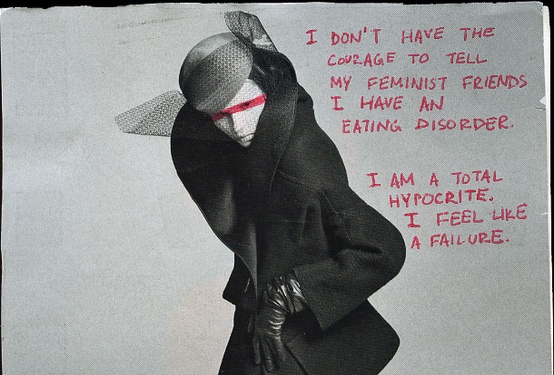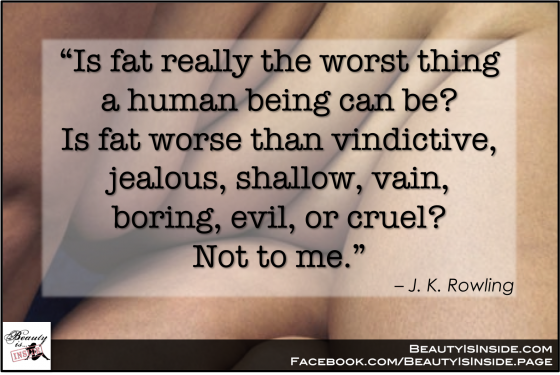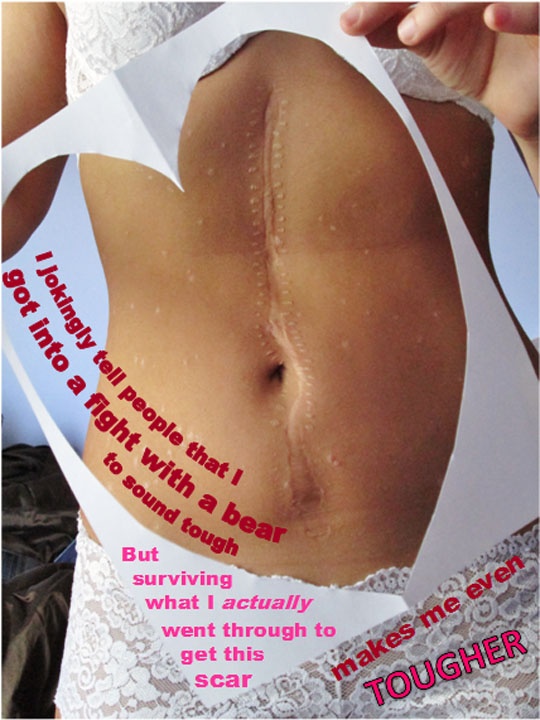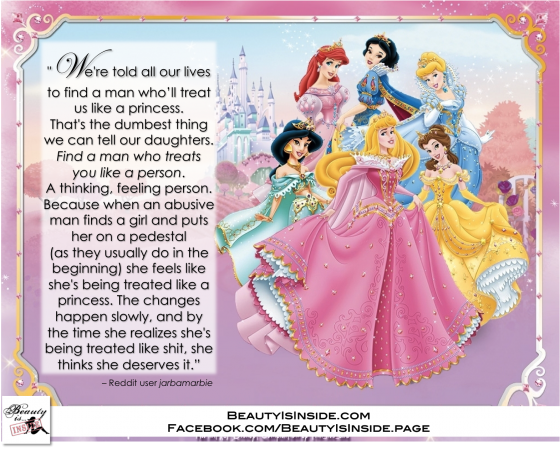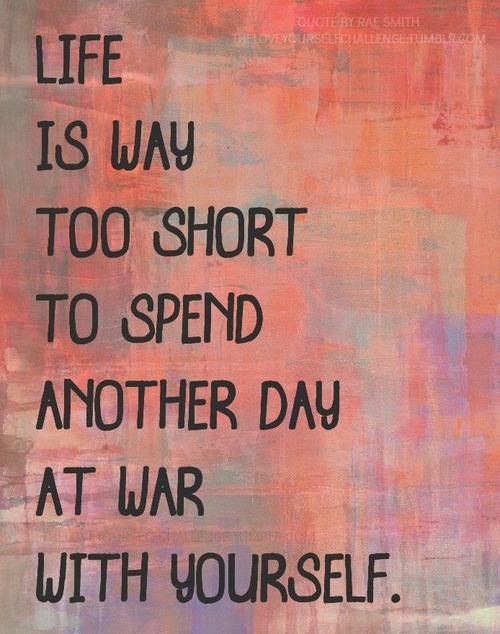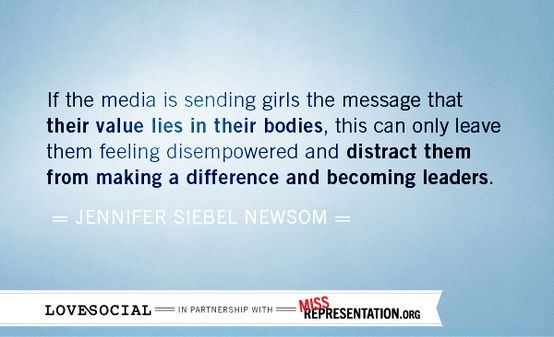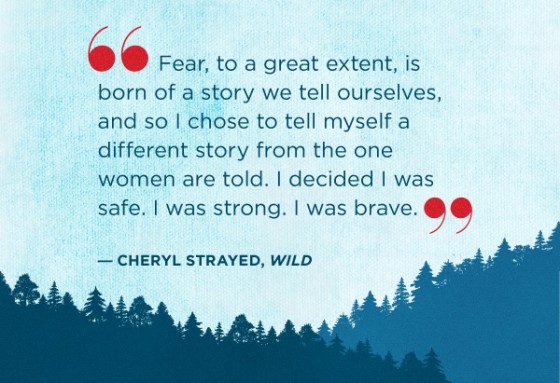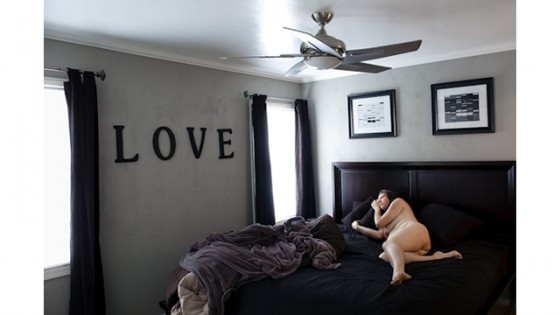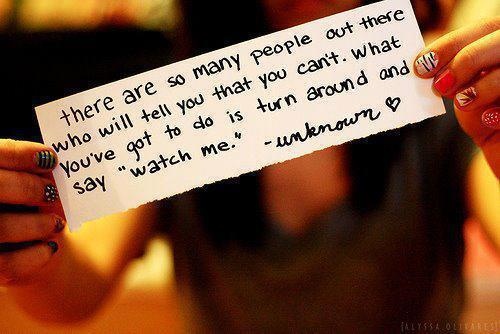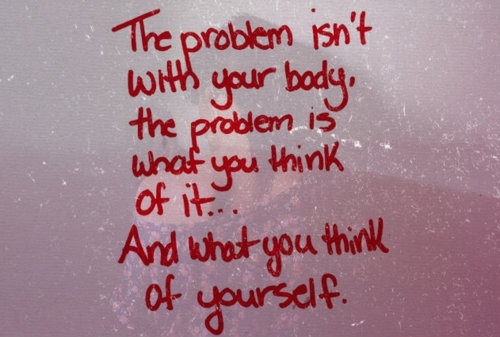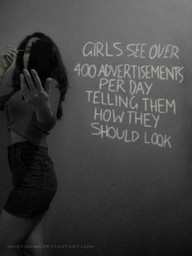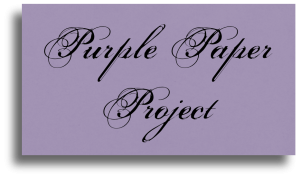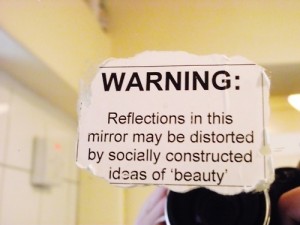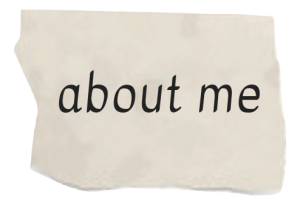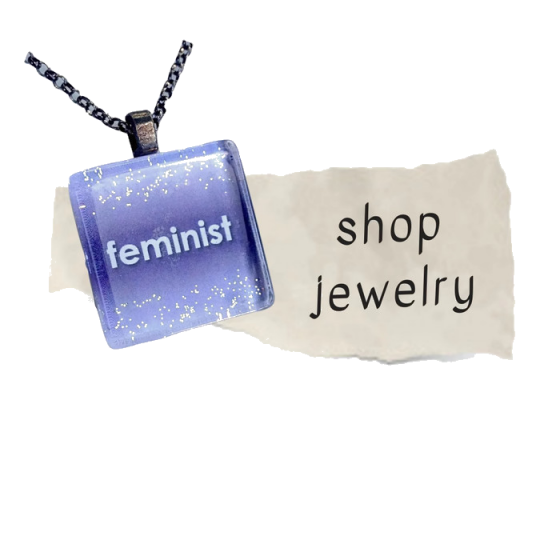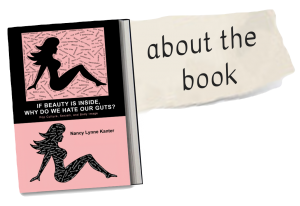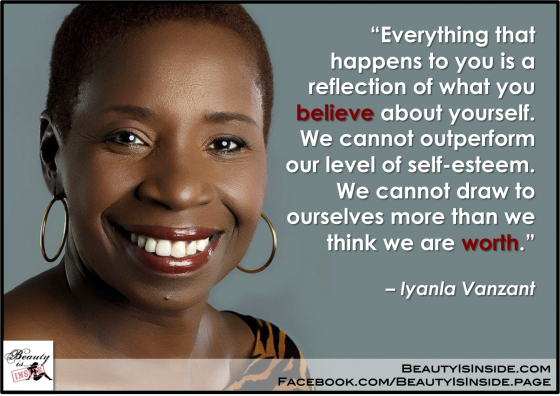
Posts in category Self-esteem
Here Comes the Judge
Also consider this when someone else is judging you. Too often, we take things personally when it's really about the other person's issues.
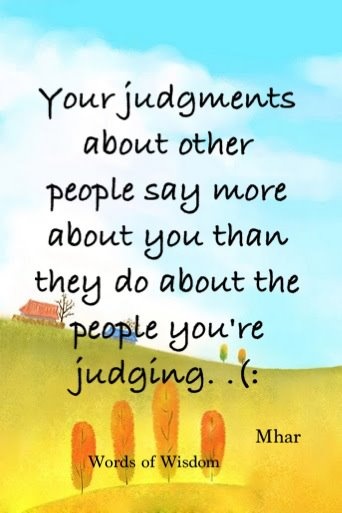
Photo Diary
In this emotionally powerful project, Julia Kozerski uses her photography skills to capture her "... private struggles with food, obsession, self-control, and self-image."
"We are flooded with media messages and images about losing weight: PSA campaigns, sneaker ads, reality shows, before and after commercials, in which celebs beam with joy in photos proving that they've slimmed down. They're often perfectly toned, in a bikini, grinning ear to ear.
"Julia Kozerski's artwork is very, very different. She faces the camera not with a smile, but with a steady, open, challenging gaze. Sometimes there are tears in her eyes. Sometimes she doesn't face the camera at all. ... "We're not accustomed to seeing documentation of this sort: A woman's body photographed not for the male gaze, not Photoshopped and airbrushed and rendered perfect so as to be more easily digested by the public."
A Woman’s Declaration of Independence
The following is an excerpt from the upcoming book -- If Beauty Is inside, Why Do We Hate Our Guts?: Pop Culture, Sexism, & Body Image. Read the first chapter here.
It's time to declare independence, to separate ourselves from the bad habits, the stifling expectations, and the negative messages that no longer serve us (assuming they ever did).
It's time to declare independence from media messages that tell us we're ugly if we don't look like the "flawless" images of celebrities on the screen and in the magazines. It's time to stop buying into the manipulation and stop wasting time trying to chase an illusion that doesn't even exist.
It's time to declare independence from the belief that having the perfect body will make us worthy of love and respect. We're already worthy of love and respect in the bodies we have now -- no amount of weight loss or plastic surgery will increase our value.
It's time to declare independence from dieting, from deprivation, from seeing food as the enemy. The American weight loss industry makes nearly $60 billion a year trying to convince us that we're not good enough -- if diets worked, would they be this profitable? It's time to stop contributing to their false sense of hope.
It's time to declare independence from body loathing, from looking at our bodies with disgust instead of love. It's time to appreciate all of the amazing things they do for us -- the jiggly arms that give great hugs, the flabby thighs that carry us through the park, the droopy breasts that fed a child, the wounded heart that still knows how to love, the exhausted brain that still manages to tell our lungs to breathe.
It's time to declare independence from spending so much time, energy, and money trying to fit into someone else's idea of whom we should be. It's time to put ourselves first, to focus on our own desires and do what we want instead of what's expected of us. It's time to trust our instincts and become someone we're proud of.
It's time to declare independence from shame, from the belief that we're not good enough, not beautiful enough, not thin enough, not smart enough, not clever enough, not sexy enough. It's time to declare that we are already enough -- that we are perfectly imperfect exactly as we are.
It's time to declare independence from the oppressive labels of virgin or whore, straight or gay. Our sexuality does not define us. It can't possibly define what kind of person we are or what's in our hearts or our minds. Any attempt by others to claim otherwise is an attempt to control us, to police our behavior, and to shame us so that they don't have to examine their own ignorance and fear.
It's time to declare independence from the belief that we can bring sexual assault upon ourselves based on how provocatively we're dressed, how flirty we act, or how drunk we get. The only person responsible for a rapist's behavior is the rapist himself. We have a right to feel safe in the world.
It's time to declare independence from legislators who think the female body should be controlled by wealthy, middle-aged, white, conservative men. Our bodies belong to us -- it's time to declare our freedom to make our own decisions about them. Because if we cannot, then we are truly not equal citizens and this country as not as free it claims to be.
It's time to declare our independence from any force that tries to hold us down -- especially those forces that limit us from within.
Life Lessons from my 95-Year-Old Grandma
My grandma just celebrated her 95th birthday. It's hard for me to believe her age, because she hasn't changed much since I was a kid.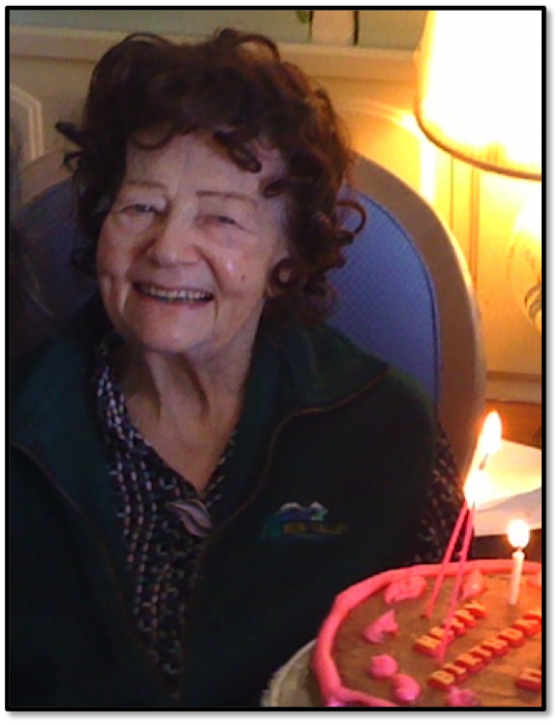 Sure, she repeats herself a little, but so do I after a few glasses of wine. She walks with a cane since a knee surgery a few years ago, but she'll still show you a few dance moves if you ask. She has fabulous skin, which she attributes to her vitamin E cream and "sleeping on my head" (i.e., on her back with a few pillows). She is so sweet but has a wicked sense of humor. When people ask her how she's doing, her answers are either, "Fine and dandy, sweet as sugar candy!" or "I'm doing them all, and the cute ones twice!" She's my little Jewish grandma who stands at least a foot shorter than me (I'm 5'5"). She often reminds people: "I might be small, but I'm mighty -- Mighty Mouse!" And she is -- she's the leader of the family, always there with advice and opinions, whether you want to hear them or not. (We usually do.)
Sure, she repeats herself a little, but so do I after a few glasses of wine. She walks with a cane since a knee surgery a few years ago, but she'll still show you a few dance moves if you ask. She has fabulous skin, which she attributes to her vitamin E cream and "sleeping on my head" (i.e., on her back with a few pillows). She is so sweet but has a wicked sense of humor. When people ask her how she's doing, her answers are either, "Fine and dandy, sweet as sugar candy!" or "I'm doing them all, and the cute ones twice!" She's my little Jewish grandma who stands at least a foot shorter than me (I'm 5'5"). She often reminds people: "I might be small, but I'm mighty -- Mighty Mouse!" And she is -- she's the leader of the family, always there with advice and opinions, whether you want to hear them or not. (We usually do.)
My grandma was born in Pittsburgh, Pennsylvania as the middle child of seven and now has just one sister left. She wanted to be a nurse when she was a girl, but she got married as a teenager and moved across the country to California and started a family instead. She and my grandfather owned several businesses, from a neighborhood market and sandwich counter in the heart of Los Angeles to a motel near the coast that catered to travelers and truckers. She and my grandpa raised four children and ran the family businesses together. To this day, she still answers the office phone and does some bookkeeping. She was never just the little woman. Like she says, she's mighty -- Mighty Mouse.
My grandma taught me to trust my instincts, to pause when I wasn't sure and listen to the voice inside. Her 95 years have provided her with a lot of wisdom, so I asked her if she could share a few things with my readers. Here's what she had to say:
On Love:
"Your grandfather always used to tell me, 'As long as I'm with you, I'm happy.' You need to have a man who cares. Couples should be thoughtful of each other. If you want respect, you have to give respect."
On Self-Esteem:
"If you're not for yourself, who shall be for you? You've got to have self-worth and confidence. You have to have respect for yourself."
On Beauty:
"Looks aren't everything -- it's how your mind works and your heart. Don't be jealous of the next person. Make the best of what you have."
On Equality:
"If a man tries to control a woman, he's being very thoughtless. He's being selfish, absolutely. Just because she's female doesn't mean he should be able to take charge. You can't let a man take advantage of you."
On a Woman's Right to Choose:
"You have to do what makes you happy. You have to decide on that yourself. They have to leave it up to the woman."
I love that my 95-year-old grandma's a feminist, whether she realizes it or not. She's loving, strong, witty, feisty, and wise. I hope to be like her when I grow up.
Courage to be Real Campaign
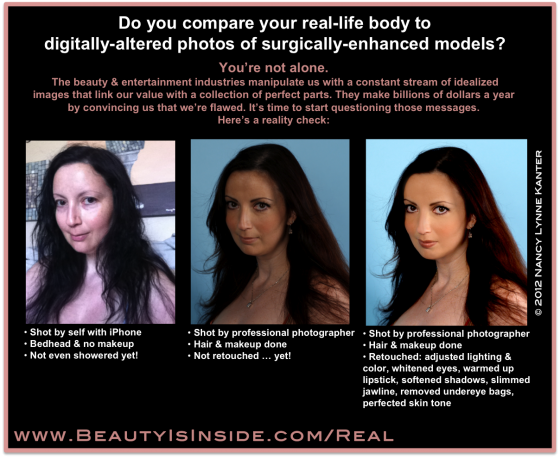
This is me. Don't think for one second that posting a picture of myself with dirty hair, no makeup, and in unflattering lighting didn't take some ovaries! Like many women, I've struggled with not feeling pretty enough, thin enough, perfect enough. I'll be the first to admit that I think I look the best in the photo on the right. It's the photo I use on the back of my book and on the About Me page of this website. I am definitely a product of our beauty-obsessed culture. But this is also me sacrificing my vanity for the greater good. How can I talk about body acceptance and the need to fight against sexist and oppressive imagery if I'm not being real with myself? It takes courage to be real. So everyone, this is what I look like in the morning. Deal with it.
The media manufacture female insecurity for profit. They invent flaws in our appearance and pressure us to fix them. They segment the female body as if it were a bucket of chicken -- we're just legs and breasts and thighs. They convince us that our bodies are too meaty and fatty, our skin is too greasy, and our hair is too fried. They manipulate us with idealized images of hot chicks who were perfected by plastic surgeons, injectable facial fillers and paralyzers, professional photographers, makeup artists, special lighting, hair stylists, fashion designers, and finally photoshopping. And then we compare our real selves with this illusion. It's not a fair fight.
A woman's appearance is always treated as relevant. Tabloids critique female celebrities for gaining weight or having the "worst beach body". The Playmate of the Year is featured on the evening news. Political commentators assess female candidates' appearance almost as much as their political beliefs. We're trained to think that our sexuality is our primary source of power. I discuss this in my upcoming book, If Beauty Is Inside, Why Do We Hate Our Guts?: Pop Culture, Sexism, & Power. In the recent documentary Miss Representation, the filmmaker also examines how our culture's sexualization of women actually minimizes our power in society. Just think about it -- if the most powerful women in the country are reduced to their looks, how can any of us expect to be treated with respect?
It starts with respecting ourselves and having the courage to be real. We have to stop allowing the media to define us in such a superficial and demeaning way. When we pull back the curtain, we see that the sculpted and perfected illusion is just a real woman who has more in common with us than we think.
I wasn't exactly excited to share my naked face with the Internet, but I put together the above image so that you could see the reality behind the special effects. I'd love to see models and celebrities do the same, but their careers depend on them maintaining the illusion. So for now, maybe it'll just be up to us regular women. And that brings us to Beauty Is Inside's new "Courage to be Real" Campaign!
The "Courage to be Real" Campaign is about cracking the illusion of perfection that makes us hate our bodies and compete with each other. I challenge you to be courageous and send in "before and after" photos of yourselves, along with what was manipulated in the "after" photo. Send your photos to real@beautyisinside.com. I'll collect them all in a photo gallery on this site, and I'll also post them on the Beauty Is Inside Facebook page and on Twitter @_BeautyIsInside.
Come on -- if I did it, so can you! Together, we can inspire other women and girls to have the courage to be real themselves.
Purple Paper Project
I'm pleased to announce my new "ad campaign" -- introducing the "Purple Paper Project"! For this project, I'll be critiquing offensive advertising messages with the help of little purple papers and a little snark. Each new ad will be posted here on my blog, and I'll compile them together in the "Purple Paper Project" tab in the right sidebar.
We see about 3000 advertising messages everyday. Even when we're not paying attention, they're always in the background. Cumulatively, these messages affect how we feel about ourselves. In so many ways, they tell us we're too fat, our skin looks like crap, and our house is a mess. They teach us what society expects of us -- and how we're not measuring up. They play on our insecurities, and even invent new ones for us to obsess over (cankles, anyone?). But don't worry, because they're sure to have a product or service that can fix our "flaws"! How very convenient!
The more I started paying attention to these messages, the more I realized how manipulative, insulting, and sexist they were. And I also realized that I was buying right into them. Maybe I did need to lose weight, improve my skin, and clean my house more thoroughly.
Or maybe my weight, skin, and house were just fine the way they were.
Advertising is a one-way form of communication in which powerful corporations try to persuade us to spend our money by manipulating our insecurity. The "Purple Paper Project" is about turning this into a two-way conversation. Consumers have powerful voices too, and it's about time that we started talking back.
To kick this project off, here's an ad from Viva paper towels:
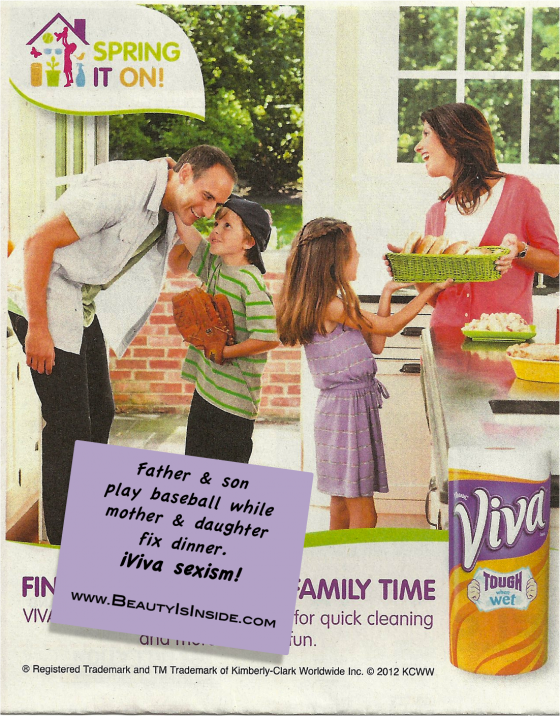
Who’s Hotter?
I recently posted an article about the image below, which is currently circulating around the Internet. As I mentioned in the previous post, this faux-empowerment message just ends up pitting thin girls against curvy girls, feeding the comparisons and competitions, and separating us all. As a result, we fight against each other instead of fighting against the beauty pressures that make us feel insecure in the first place. Here's the original image:
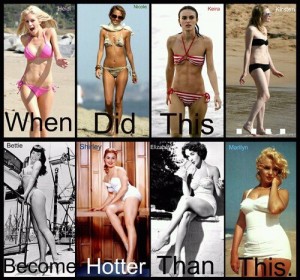
What's the next logical step?
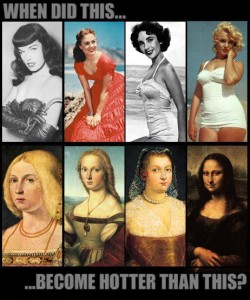
and then what about this?
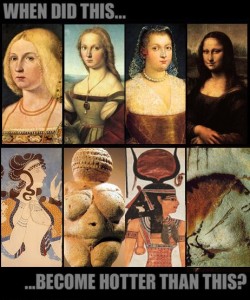
Haven't we all had enough? Isn't it about time that we move past the pettiness and start working together?
Real Women Have … Bodies
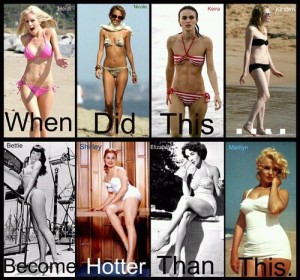
The other day, my friend shared this image on my Facebook wall. I'm sure she had good intentions, as did the creator. At first glance, it seems like a girl-power-feel-good-kind-of-message that challenges the pressure to be thin, similar to the "real women have curves" mantra made popular by the movie of the same name. It seems to be about women celebrating their curves, accepting their bodies, and not buying into the extreme dieting mentality.
But it's not. This image is about shaming thin women about their bodies under the guise of empowering heavier women. It's just the other side of the same coin.
What about women who are naturally thin? Or naturally not as curvy? Are they less hot? Are they not real women? Comparing is just one more way for us to separate ourselves.
Most of us struggle with our weight, so being in the public eye would most assuredly have an impact on how celebrities feel about their own bodies. Heidi Montag had 10 plastic surgeries so that she could look hot enough. Tabloid rumors have accused Nichole Ritchie and Keira Knightley of having eating disorders, and Kirsten Dunst was on the cover of Star Magazine for having one of the "worst beach bodies," so it's not as if any of them are being celebrated for their bodies at the moment. The media's pretty arbitrary anyway about what constitutes the hot-kind-of-thin vs. the anorexic-kind-of-thin. It's a fine line, and those celebrities who cross it are publicly shamed on tabloid covers. I'm sure Bettie, Shirley, Elizabeth, and Marilyn faced their share of scrutiny and pressure as well based upon the beauty standards of their time. Elizabeth Taylor, for one, suffered from both eating disorders and substance abuse. Considered by many to be the most beautiful woman in the world, she was once quoted as saying, "I don't like my voice. I don't like the way I look. I don't like the way I move. I don't like the way I act. I mean, period. So, you know, I don't like myself."
Beauty is subjective. Others' opinions about us are irrelevant -- what matters most is how we see ourselves.
The body snarking, the gossipy headlines about who has anorexia or who's getting fat, the who's hotter comparisons -- these all promote the age-old competition to determine the fairest of them all. And eating disorders are part of this futile attempt to fit what society deems "hot".
There's value in simply being who we are, whether we're thin or fat or have curves or not. So, in response to the question: "When did this become hotter than this?", here's another question: Why do we have to cut someone else down to feel better about ourselves?
This Is Your Life
This past Christmas morning, 8-year-old Elijah anxiously waited for his mom to return from work so they could open presents together. Donna Fountain left for her job in Brooklyn at 7:30am. She was a single mother and her hard work as a home health care worker allowed her to provide for her son -- even if it meant she had to work on Christmas Day. But soon after leaving the house, Donna was struck and killed by a hit-and-run driver while crossing the street. Police found a folded and wrinkled slip of notebook paper on the 38-year-old woman's body. Donna carried it with her everywhere. On that piece of paper, Donna had written out five life goals that she had hoped to accomplish. She titled this list "My Dreams":
- Work on my dream job.
- Buy a house by 45.
- Start housing for gay and lesbian teens.
- Marry the woman of my dreams.
- Make sure Elijah graduates from college!
A careless and heartless driver stole Donna's chance to see these dreams materialize. They remain immortalized in pencil on a crumpled slip of paper. Many of us have similar lists of our own, either written down or simply living in our heads. We postpone them, assuming we have plenty of time left. But this isn't always true.
As New Year's Day approaches and we start compiling our lists of resolutions (which are generally just variations on last year's), maybe we should think twice about our dreams for the year. Instead of the typical "lose weight," why not strive for more meaningful pursuits? Why not let Donna's dreams inspire us to live our own? Why not resolve to be the best version of ourselves? To really LIVE? And then to drag the words off the paper and turn them into action?
Note that nowhere on Donna's list of dreams was "Lose 20 pounds."
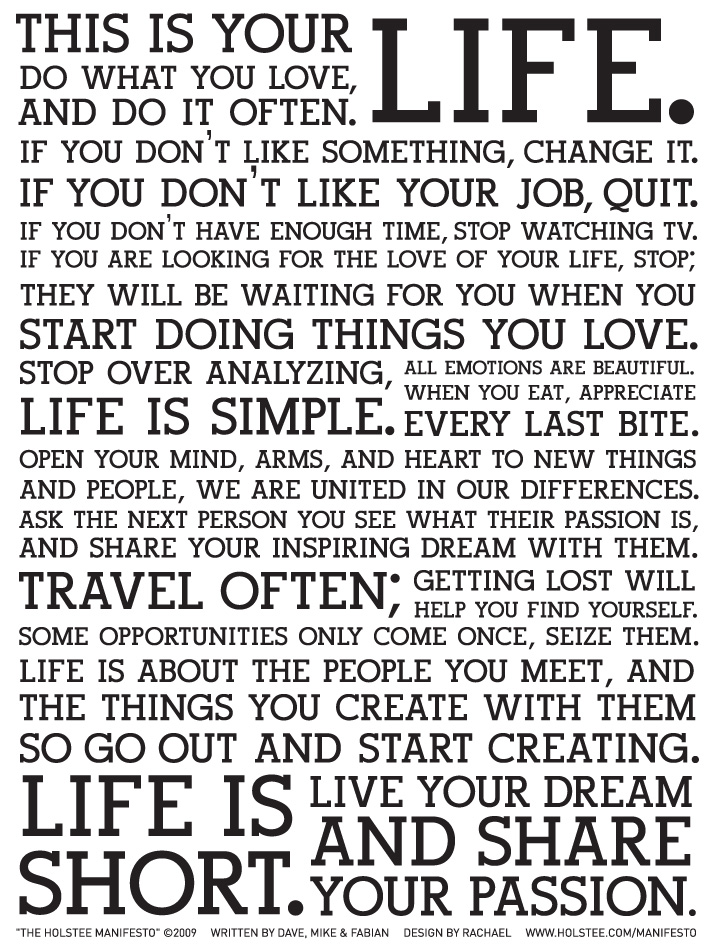
Feminist Action Figures!
Here's an awesome fake commercial advertising the Brontë Sisters Power Dolls. Named after the classic-novel-writing-sisters Charlotte, Emily, and Anne Brontë, the dolls were featured as part of a 1998 series that re-imagined historical figures as action figures. In this commercial, kids make the Brontë Sisters fight against the evil publisher so they can get their books into print. The Brontë Sisters come with Super Disguise Mustaches! and Boomerang Book-Throwing Action!, and can transform into a Brontësaurus with barrier-breaking feminist vision! Check it out:
Unfortunately, these dolls aren't real. For now, girls will just have to choose from Bimbo Barbies who stand around looking pretty, Bratz Dolls who look like mini porn stars with eyes larger than their waists, and Disney princesses who always seem to be waiting for their princes to save them.
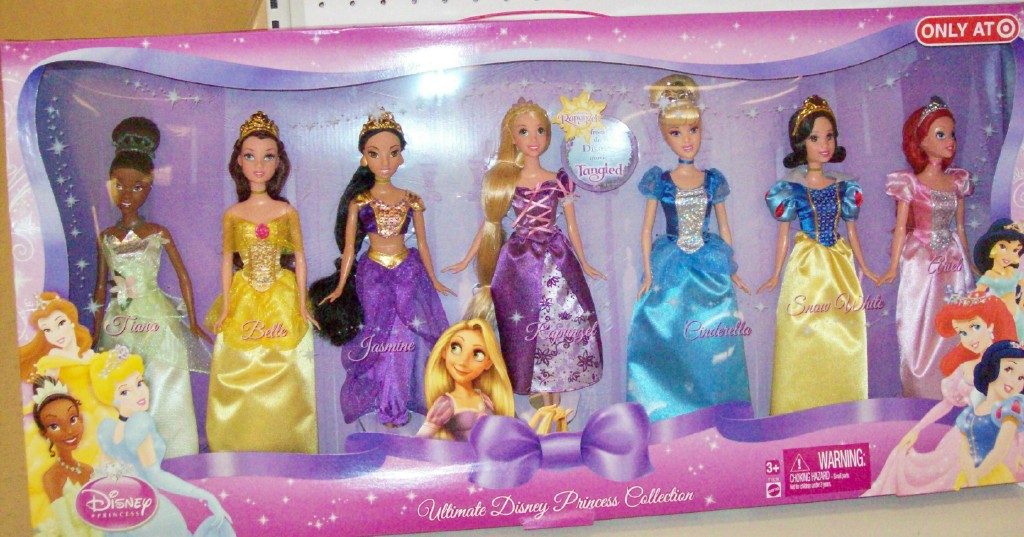
I'd like to think as a girl, I would've chosen the Brontë Sisters Power Dolls (if they existed) over the others. But honestly, I'm not so sure. (I totally wanted to be Cinderella.) As a culture, we need the barrier-breaking feminist vision to offer girls more options so that they can emulate cool action figures like the Brontë Sisters. Otherwise, they'll just keep getting more inaction figures that reinforce the value of standing around looking pretty.
Revenge of the Nerd
I often write about how women can reclaim our power against a culture that tells us that our bodies are our most valuable attributes. My passion about this issue was partly due to years of being bullied about my looks (among other things) as I grew up. I was one of the unpopular  kids from elementary through high school, and so being bullied was part of life. I had no idea why the other kids didn't like me, and I tried hard to figure it out. I would sit by myself outside of the library at lunchtime in my rainbow-striped top, my tan corduroy knickers that buttoned right below the knee, my burgundy knee socks, and my freshly-white-shoe-polished Payless tennis shoes, wondering why no one liked me. You'd better call Nancy Drew, because we have a mystery! My grandma told me the girls were just jealous because I was so much prettier than they were. I wish I were able to believe her, but grandmas have to say things like that.
kids from elementary through high school, and so being bullied was part of life. I had no idea why the other kids didn't like me, and I tried hard to figure it out. I would sit by myself outside of the library at lunchtime in my rainbow-striped top, my tan corduroy knickers that buttoned right below the knee, my burgundy knee socks, and my freshly-white-shoe-polished Payless tennis shoes, wondering why no one liked me. You'd better call Nancy Drew, because we have a mystery! My grandma told me the girls were just jealous because I was so much prettier than they were. I wish I were able to believe her, but grandmas have to say things like that.
I used to talk my mom into calling in sick for me all the time during junior high. I kept getting stomach aches right before the time we were supposed to leave for school. Concerned about my illness, my parents took me to a doctor who decided that I suffered from lactose-intolerance from the milk in my morning Cheerios. So my parents switched me to soy. No surprise – the stomach aches continued, because I wasn’t allergic to milk. I was allergic to the little shits who teased me. I was allergic to the dirty looks, the shunning, and the insults from the mean girls. I was allergic to being called ugly, smelly, and Casper because I was so pale. I was allergic to the shaming sting of cootie spray if I accidentally got too close to someone. I was allergic to being left out, to being picked last for teams, to being treated as if I were sub-human. I was allergic to no one standing up for me and to not having the tools to do it myself. Unfortunately, soy milk couldn't fix any of that.
Fast forward to my recent high school reunion. I wanted to see old friends, but I was dreading seeing the bullies who made my life hell. I was frustrated that they still had a hold on me, even as an adult. I had given them too much power for too long ... but now it was time to take it back.
As the night progressed, I finally got up the nerve to stand up for myself. I just knew I'd regret it if I didn't. So with the help of a few glasses of liquid courage, I confronted two of the mean girls and two of the mean guys. I didn't plan out exactly what I would say; I just ended up being real. I pulled each of them aside and nicely asked if I could speak to them for a moment. And one by one, I told them that they were pretty mean to me back in school, and I just wanted to know why. Was it something about me? I had spent years believing that it was me -- that I was bullied because I wasn't pretty enough, or thin enough, or simply just not enough.
And an amazing thing happened. Three out of the four bullies immediately apologized. The two guys acknowledged that they were jerks, and they both admitted that they took out their insecurities and family issues on other kids. That it had nothing to do with me. I wasn't prepared for them to be so introspective. One girl claimed that she didn't remember being bitchy to me, but she still apologized several times, hugged me, and seemed to feel guilty. The last girl just coldly stated that I was asking about something that happened many years ago, insisted that she didn't remember anything, and then reminded me again that it was many years ago.
But her response really didn't matter. None of their responses did. I confronted my bullies because I needed to stand up for myself, regardless of their reactions. And this time, I was detached enough to realize that their apologies or their denials had everything to do with them -- and nothing to do with me. When someone treats us poorly, often our first instinct is to wonder what it was about us that deserved the crappy treatment. Due to our own insecurities, we absorb their insults without considering that they actually reflect the insecurities of the other person. The worst part is when we take over the bullying ourselves.
Our early years can profoundly affect us long after we graduate. We spend less than 20 years in childhood, and another 20+ trying to undo the damage. If there’s a bright side for me, it's made me even more compassionate toward any group that's oppressed, because I know how much it hurts to be bullied and how much it sucks when no one defends you.
But the bullies aren't just in high school. The grown-up bullies have just graduated on to being mean in other ways -- to being critical and abusive partners and parents, to opposing the "homosexual lifestyle" and marriage equality, to treating other races as second-class citizens, to being intolerant and judgmental of others' religions or lack thereof, to supporting legislation that prevents women from having control over our own bodies, to treating women as dehumanized sexual objects. The media are a grown woman’s tormenters. They’re the mean girls and boys who tell us we’re ugly and fat, and that no one will like us unless we adhere to superficial beauty standards. I use my writing as a way of standing up to them.
We may have graduated from the playground, but we’re not immune to feeling bullied. The little kids inside us still want to be popular and accepted, and we don't want to be rejected. However, as grown-ups, we have more strength and resources than we had as children. We’re not the same powerless little kids. We no longer have to cry into our pillows at night. We’re old enough to fight against the bullies -- and to decide not to be bullies ourselves. We matter. We’ve always mattered, even if others were too blind or immature or insecure or heartless to recognize it. This was true when we were children, and it remains true as adults.
There will always be those who try to keep others down, but it's up to us to decide if we want to stand up to them or let them continue to victimize us. It's up to us to take our power back. And it's up to us to have the courage and compassion to stand up for others who have less power than we do.
And let me tell you -- it feels damn good to finally stand up.
Ugly Shade of White
I grew up in the suburbs of Southern California. Early on, I learned that there were subtle rules of what constituted an acceptable skin color in a primarily-white school. And these rules were separate from racial differences -- they were the rules about what white skin was supposed to look like. In my case, I was indeed white. The problem was that I was too white. I was Casper-white, glow-in-the-dark white, butt-white ... the ugly shade of white. To the other kids, my pale skin and dark hair contrasted in a bad way. Where I was from, you were supposed to contrast in a good way, meaning blonde hair and tan (but still white) skin. I got accused of being goth (that's like emo to those of you born a little later); I wasn't, but my corpse-like skin tone was what goth kids dreamed of. The popular kids regularly sneered that I should get a tan, and damn if I didn't try.
 I desperately wanted to be tan, because tan = pretty. Over the years I tried everything. I wore coffee-colored pantyhose under skirts and even shorts(!) on 90-degree days. I sunned myself on towels in my parents' weed-covered backyard. I over-baked in tanning beds until I got bulb-burn-stripes down my body. I broiled in the Acapulco sun like a crustacean on a BBQ until my bright red legs made standing so excruciating that I had to seek medical help. (As I was basting myself with the 0-SPF coconut oil I bought from a beach vendor, a passing woman stopped to tell me how beautiful my light skin was. How ironic.) No matter what method I tried, my skin only managed to turn from white to pink to red. And then ultimately to freckles. I just hope that I won’t develop skin cancer due to my efforts.
I desperately wanted to be tan, because tan = pretty. Over the years I tried everything. I wore coffee-colored pantyhose under skirts and even shorts(!) on 90-degree days. I sunned myself on towels in my parents' weed-covered backyard. I over-baked in tanning beds until I got bulb-burn-stripes down my body. I broiled in the Acapulco sun like a crustacean on a BBQ until my bright red legs made standing so excruciating that I had to seek medical help. (As I was basting myself with the 0-SPF coconut oil I bought from a beach vendor, a passing woman stopped to tell me how beautiful my light skin was. How ironic.) No matter what method I tried, my skin only managed to turn from white to pink to red. And then ultimately to freckles. I just hope that I won’t develop skin cancer due to my efforts.
I've since given up on achieving that sun-kissed look. The sun never even hugged me, no matter how hard I chased. Apparently, he was just not that into me. He always made promises like a big tease, and then ended up burning me over and over again. Trust me -- the sun's not that hot. Even if he fulfills his promise of a glowing tan, you'd better get yourself checked out. No one wants to bring home an outbreak of melanoma. Since I kicked the sun to the clouds, I use alternative methods of tanning. I now slather or spray stinky-smelling and streaky tanning shit. Or I just wear pants or a maxi-dress. (And that way, I don't even have to shave.)
It hurt to be judged for being too white, and I absorbed the criticisms as much as I did the damaging rays. No girl wants to feel ugly.
Women all across the skin color spectrum are affected by beauty standards. These standards come from both the dominant culture, as well as from each minority group within. In the Hispanic culture, skin that's "too dark" isn't generally considered attractive. Darker skin indicates more Indigenous blood than the preferable Spanish European blood. I've heard several people comment about the good-looking gueros (light-skinned males and females). I've heard women gossip about their friend's new baby: "Mira la morenita, la pobrecita" (Look at the little dark one, the poor thing). The telenovelas (soap operas) popular on Spanish television channels primarily feature light-skinned actors. Skin color doesn't just matter outside of their community -- it also matters within.
In the soon-to-be-released documentary, "Dark Girls," the filmmakers examine how attitudes about skin color affect women. They focused on dark-skinned African-American women, but as I watched the preview below, I could empathize with the self-disdain. One woman talks about how she felt about her skin as a little girl: "I can remember being in the bathtub asking my mom to put bleach in the water so that my skin would be lighter and so that I could escape the feelings I had about not being as beautiful, as acceptable, as lovable."
We can't control how others treat us, but we can control the way we treat ourselves. Why do we keep trying to find ways to separate and judge ourselves? I was teased about being too white, so I learned to view my white skin with disdain. It's sad enough that darker-skinned minorities are discriminated against by whites based on skin color, but even sadder that some would do the same to themselves. Please note that I am not saying that being "too white" is at all comparable to the racism experienced by people for being "too dark." The only aspect I'm comparing pertains to beauty standards. Clearly, there is a long and painful history of racism and discrimination in our country. What I can relate to is how it felt to be a little girl who thought she wasn't pretty enough because her peers judged her based on an arbitrary rule about the amount of melanin in her skin. If I could've added self-tanner to my bathwater as a kid, I would've done it.
It's heartbreaking to think that an innocent little girl would feel so ugly that she'd want to add bleach -- or self-tanner -- to her bathwater. But it's also a reminder of how we as women don't need others to hold us down. After awhile, we learn to do it to ourselves.

